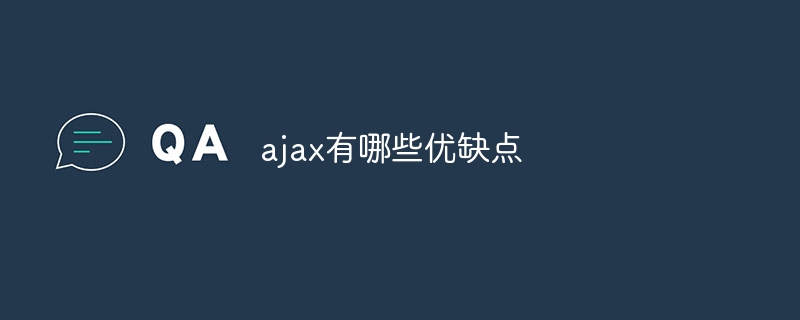
The advantages of ajax include improved user experience, asynchronous processing, better performance, rich interaction, cross-platform and browser compatibility, etc. The disadvantages of ajax include complexity, dependence on network connections, unfriendliness for search engines, security issues, support for mobile devices, support for older browsers, etc. Ajax is a web development technology that uses several technologies to allow data to be exchanged with the server through asynchronous requests without refreshing the entire page. It can obtain or submit data through asynchronous requests to achieve partial refresh of the page without reloading the entire page.

The operating system for this tutorial: Windows 10 system, DELL G3 computer.
AJAX (Asynchronous JavaScript and XML) is a web development technology that uses multiple technologies to allow data to be exchanged with the server through asynchronous requests without refreshing the entire page. AJAX can obtain or submit data through asynchronous requests to achieve partial page updates without reloading the entire page. This technology improves the user experience and increases the performance and responsiveness of web applications. However, like any technology, AJAX has its pros and cons.
Advantages
1. Improve user experience: AJAX allows data exchange and update with the server without refreshing the entire page, which allows the page to be updated partially instead of refreshing the entire page. . This smooth update method provides a smoother user experience.
2. Asynchronous processing: AJAX uses asynchronous requests, which means that it does not block the operation of the user interface. While waiting for the server to respond, the user can continue to interact with the page without delays or waits.
3. Better performance: Because AJAX avoids full page refresh, unnecessary data transmission and server load are reduced. This makes web applications more efficient and responsive.
4. Achieve rich interaction: AJAX enables developers to create web applications with rich interactive features, such as dynamic content, form validation, real-time search, etc. These features are difficult to implement in traditional synchronous requests.
5. Cross-platform and browser compatibility: AJAX mainly relies on standard web technologies, such as HTML, CSS and JavaScript. Therefore, it can run on various browsers and platforms with great compatibility.
Disadvantages
1. Complexity: Although AJAX makes it easier to develop more complex web applications, it also increases the complexity of the code. Handling asynchronous requests, handling errors, and debugging code correctly can be more difficult than using traditional synchronous requests.
2. Dependence on network connection: Since AJAX is based on network connection, the AJAX function will not work properly if the user is offline or the network connection is unstable. This can have a negative impact on user experience.
3. Unfriendly to search engines: Since the page content generated by AJAX is not directly generated on the server side, search engines may not be able to correctly index and parse the content. This may affect your website's ranking in search engines.
4. Security issues: AJAX may cause some security issues, such as cross-site scripting attacks (XSS) and cross-site request forgery (CSRF). An attacker could exploit these vulnerabilities if AJAX requests and responses are not handled correctly.
5. Support for mobile devices: Although AJAX is widely supported in desktop browsers, there may be some problems on mobile devices. Some older mobile devices may not fully support AJAX functionality, or support may vary.
6. Support for older browsers: Some older browsers may not fully support AJAX technology, which may cause compatibility issues. Although most modern browsers support AJAX, it may not work properly on some older browsers.
To sum up, AJAX provides many advantages, such as improved user experience, asynchronous processing, better performance, etc. However, it also has some disadvantages to consider, such as complexity, dependence on network connectivity, search engine unfriendliness, security issues, and support issues for mobile devices and older browsers. When deciding whether to use AJAX, these pros and cons need to be considered based on your project needs and goals.
The above is the detailed content of What are the advantages and disadvantages of ajax. For more information, please follow other related articles on the PHP Chinese website!




